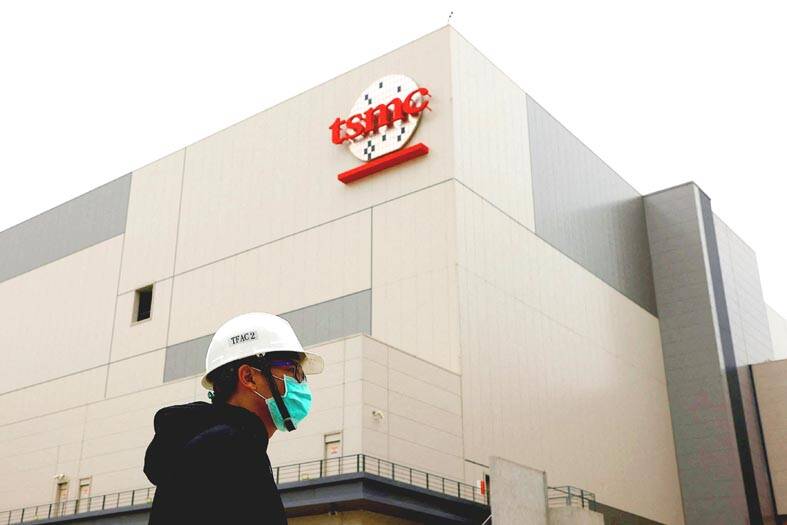South Korea’s SK Hynix Inc, the world’s second-largest memorychip maker, yesterday said that it would collaborate with Taiwan Semiconductor Manufacturing Co (TSMC, 台積電) to make the next-generation high-bandwidth memory (HBM) chips used in artificial intelligence (AI) technology.
SK Hynix dominates the market for HBM chips — crucial components to power AI — and is a top supplier to US-based chip titan Nvidia Corp. TSMC also supplies Nvidia.
The South Korean company “recently signed a memorandum of understanding with TSMC for collaboration to produce next-generation HBM,” SK Hynix said in a statement.

Photo: Ann Wang, Reuters
SK Hynix “plans to proceed with the development of HBM4, or the sixth generation of the HBM family, slated to be mass produced from 2026, through this initiative,” the statement added.
“We expect a strong partnership with TSMC to help accelerate our efforts for open collaboration with our customers and develop the industry’s best-performing HBM4,” SK Hynix president Justin Kim said. “With this cooperation in place, we will strengthen our market leadership as the total AI memory provider further by beefing up competitiveness in the space of the custom memory platform.”
To develop HBM4, TSMC’s “advanced logic process” would be adopted to produce “customized HBM that meets a wide range of customer demand for performance and power efficiency,” SK Hynix said.
The two companies would also collaborate to optimize the integration of SK Hynix’s HBM and TSMC’s chip-on-wafer-on-substrate packaging process, the South Korean company said.
“TSMC and SK Hynix have already established a strong partnership over the years. We’ve worked together in integrating the most advanced logic and state-of-the art HBM in providing the world’s leading AI solutions,” TSMC deputy cochief operating officer Kevin Zhang (張曉強) said.
SK Hynix last month said that it had begun mass production of the HBM3E, the latest HBM iteration.

‘ABUSE OF POWER’: Lee Chun-yi allegedly used a Control Yuan vehicle to transport his dog to a pet grooming salon and take his wife to restaurants, media reports said Control Yuan Secretary-General Lee Chun-yi (李俊俋) resigned on Sunday night, admitting that he had misused a government vehicle, as reported by the media. Control Yuan Vice President Lee Hung-chun (李鴻鈞) yesterday apologized to the public over the issue. The watchdog body would follow up on similar accusations made by the Chinese Nationalist Party (KMT) and would investigate the alleged misuse of government vehicles by three other Control Yuan members: Su Li-chiung (蘇麗瓊), Lin Yu-jung (林郁容) and Wang Jung-chang (王榮璋), Lee Hung-chun said. Lee Chun-yi in a statement apologized for using a Control Yuan vehicle to transport his dog to a

Taiwan yesterday denied Chinese allegations that its military was behind a cyberattack on a technology company in Guangzhou, after city authorities issued warrants for 20 suspects. The Guangzhou Municipal Public Security Bureau earlier yesterday issued warrants for 20 people it identified as members of the Information, Communications and Electronic Force Command (ICEFCOM). The bureau alleged they were behind a May 20 cyberattack targeting the backend system of a self-service facility at the company. “ICEFCOM, under Taiwan’s ruling Democratic Progressive Party, directed the illegal attack,” the warrant says. The bureau placed a bounty of 10,000 yuan (US$1,392) on each of the 20 people named in

The High Court yesterday found a New Taipei City woman guilty of charges related to helping Beijing secure surrender agreements from military service members. Lee Huei-hsin (李慧馨) was sentenced to six years and eight months in prison for breaching the National Security Act (國家安全法), making illegal compacts with government employees and bribery, the court said. The verdict is final. Lee, the manager of a temple in the city’s Lujhou District (蘆洲), was accused of arranging for eight service members to make surrender pledges to the Chinese People’s Liberation Army in exchange for money, the court said. The pledges, which required them to provide identification

INDO-PACIFIC REGION: Royal Navy ships exercise the right of freedom of navigation, including in the Taiwan Strait and South China Sea, the UK’s Tony Radakin told a summit Freedom of navigation in the Indo-Pacific region is as important as it is in the English Channel, British Chief of the Defence Staff Admiral Tony Radakin said at a summit in Singapore on Saturday. The remark came as the British Royal Navy’s flagship aircraft carrier, the HMS Prince of Wales, is on an eight-month deployment to the Indo-Pacific region as head of an international carrier strike group. “Upholding the UN Convention on the Law of the Sea, and with it, the principles of the freedom of navigation, in this part of the world matters to us just as it matters in the